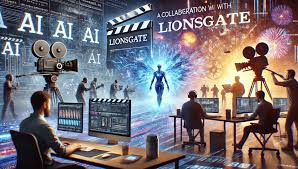
Lionsgate Embraces AI with Runway in Filmmaking Deal
Lionsgate has taken a bold step into the world of artificial intelligence by partnering with AI research firm Runway, marking a pivotal move within Hollywood. Announced on September 18, 2024, this collaboration aims to integrate AI into Lionsgate’s extensive portfolio, which includes blockbuster franchises like John Wick and The Hunger Games. The partnership, which has already started influencing Lionsgate’s productions, signifies a notable shift toward AI-enhanced filmmaking.
Lionsgate Motion Picture Chair Adam Fogelson addressed initial concerns from the creative community at a recent earnings call, reassuring filmmakers about the limited scope and ethical parameters of this AI application. “Once we clarified for our filmmaking partners, for our talent partners, exactly what this was, how it would be used, what it is, what it isn’t, we’ve had great support, and our filmmakers are using it already,” said Fogelson. The reassurance underscores the delicate balance Lionsgate hopes to maintain as it adopts AI, particularly amid ongoing debates on AI’s potential disruption in Hollywood.
For the latest news on AI in entertainment, visit our Times of Tech article on AI and media.
An Innovative Yet Cautious Approach to AI in Film
This partnership with Runway is designed to produce and train a customized AI model that suits Lionsgate’s unique production needs, potentially reducing costs while enhancing creativity. Michael Burns, Vice Chairman of Lionsgate, highlighted the potential for AI to complement rather than compete with the filmmaking process, saying, “We think this is very much going to enhance filmmaking and become an incredible tool for the community.”
The collaboration arrives at a challenging time for Lionsgate, which reported disappointing Q3 earnings due to lingering industry disruptions and a less-than-expected box office performance. However, the company’s leadership remains optimistic, seeing AI as a strategic move to boost efficiency. Lionsgate CEO Jon Feltheimer echoed this sentiment, noting, “We believe that AI, harnessed within the appropriate safeguards, can be a valuable tool to serve our talent.” He emphasized that the studio would incorporate “discipline” in utilizing AI to ensure the technology aligns with both ethical standards and industry needs.
For more insights, check out this report on the Lionsgate-Runway deal by Movieguide.
AI Integration Amid Industry-Wide Concerns
AI’s increasing presence in Hollywood has raised concerns, particularly around job displacement and the ethical implications of AI in creative roles. Unions like the Screen Actors Guild – American Federation of Television and Radio Artists (SAG-AFTRA) have voiced opposition to the uncontrolled use of AI, especially when it comes to replicating actors’ likenesses without permission. Addressing these industry-wide concerns, California Governor Gavin Newsom recently signed legislation to regulate AI replicas, aiming to safeguard performers’ rights. Lionsgate’s disciplined approach seeks to respect these limitations, reassuring talent and guilds that their AI applications are crafted within these guardrails.
While many worry about the potential downsides of AI, Lionsgate’s executives are confident that AI will positively impact the creative process. Burns likened this partnership to preparing for a forward-thinking industry shift, stating, “We think our partnership with them is gonna propel us to where the puck is heading as opposed to where it is.” This proactive approach underscores Lionsgate’s strategy of innovation in an industry that has only recently begun grappling with AI’s implications.
For an in-depth exploration of AI applications in creative industries, read our overview on Times of Tech.
AI as a Tool, Not a Replacement
Lionsgate’s approach to AI integration emphasizes its role as a supportive tool rather than a replacement for human creativity. As Runway’s AI models are specifically tailored to work within the studio’s established framework, they are expected to assist in various tasks, potentially from aiding visual effects to streamlining certain production processes. This implementation could allow filmmakers more creative freedom by reducing the burden of repetitive tasks and potentially lowering production costs.
The collaboration has already brought about positive results, with filmmakers embracing AI tools that can expedite production and bring new creative possibilities to the table. As reported by Deadline, the new AI tool’s potential was demonstrated in a sample video, hinting at the sophisticated capabilities Runway could bring to Lionsgate’s productions.
For industry readers looking to learn more about the financial and creative aspects of AI in film production, Times of Tech offers analysis on this topic.
Looking Ahead: AI in Hollywood’s Future
With Hollywood experiencing a rapid shift in AI’s role, Lionsgate’s partnership with Runway is likely a bellwether for more AI-assisted production techniques. As the industry cautiously steps forward into an AI-powered future, Lionsgate’s early adoption sets a precedent for balancing innovation with ethical considerations. While the AI integration journey may face roadblocks due to creative concerns and regulatory measures, Lionsgate’s leadership is confident that the partnership will yield long-term benefits for its content creation processes.
For Lionsgate, the Runway deal is an investment in the future, preparing the studio to navigate the evolving intersection of AI and entertainment. While uncertainties remain, this pioneering step marks an era where AI may well become an indispensable tool in Hollywood’s toolkit.
Stay updated on how AI is reshaping media and entertainment on Times of Tech.






